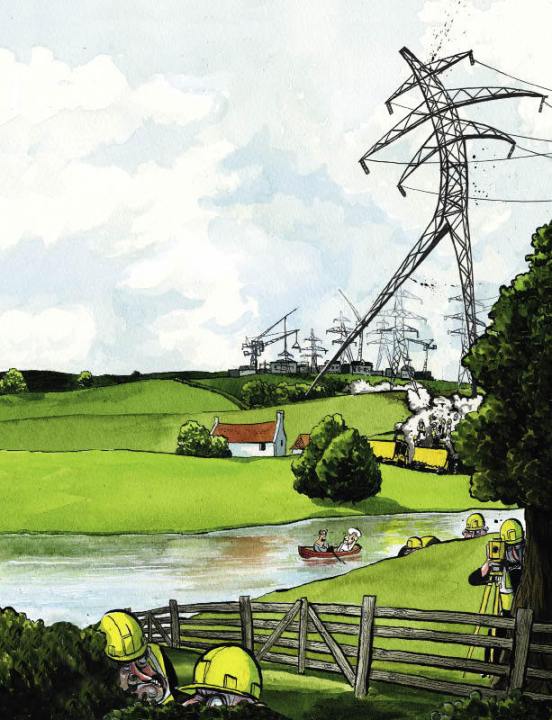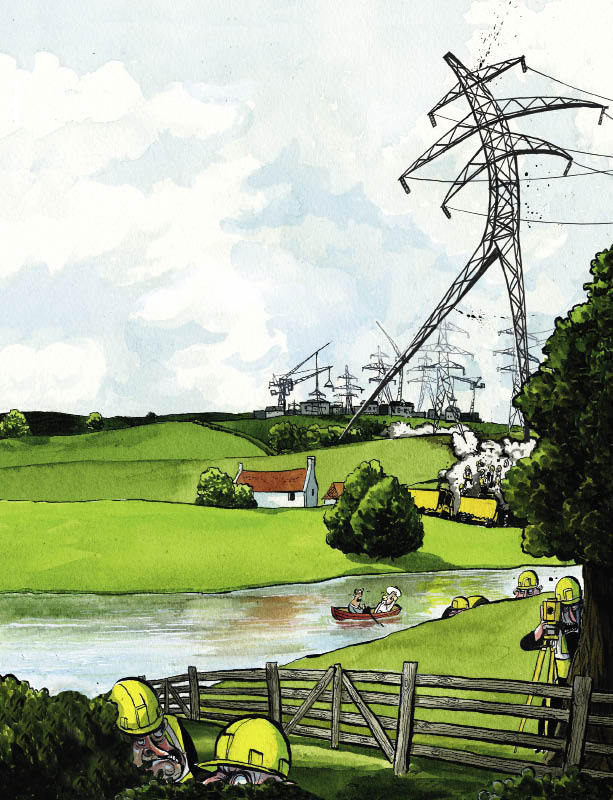The government says that 240,000 new homes a year are needed in England, but it’s a lie, says Alexander Waugh, evidenced by every estate agent’s window in the country. This policy means that government and developers win, while communities and the country lose
How do you describe your sexual orientation? Please tick: Bisexual, Gay, Heterosexual, Lesbian? Do you identify yourself as transgender? Yes? No? If yes, are you a male-to-female tranny, or a female-to-male one?
Why, I wonder, was Roger Mitchinson, a planning officer from the Taunton Deane Borough Council, last week seeking answers to these impudent questions from the inhabitants of Milverton, when his stated aim in coming to their beautiful Somerset village, was to ‘consult’ them on a scheme to erect a vast Toyland housing estate on a field of Grade 1 agricultural land overlooking the main street? Does a planning consultation need to incorporate this sort of filth? The official answer to that question is this: ‘Taunton Deane Borough Council has a policy to monitor attendance at events to ensure we reach the diverse communities that we aim to serve.’
I don’t know where the officers of Taunton Deane Planning Department picked up their definition of the verb ‘to serve’, but never, as far as I am aware, in the long and varied history of the master-servant relationship, has it been the expected or desired function of servants to seek written declarations of their masters’ sexual enthusiasms. The truth, of course, is that planning officers do not see themselves as ‘serving’ the community at all. Indoctrinated by central government rhetoric in the facile belief that anything ‘modern’ or ‘21st-century’ is necessarily best, they have no understanding of the subtleties of organic growth, the economics of supply and demand, the civilised history of urban development, or the aesthetic necessity for open space. They will tell you in bland, flat, emotionless voices that there is a ‘need’ for millions of new ‘homes’ in the South of England. They point out that the government has demanded an eye-wateringly large increase in the building of these homes, from current levels of around 130,000 a year in England to 240,000 a year. It’s due to a national ‘housing shortage’, they say.
This is a lie, easily disproved by the simple evidence of every estate agent’s shop window that bursts with advertisements for houses and flats of all sizes and prices, both for rent and for sale. There is not the least ‘need’ for development on this scale, only a gigantic and modish public appetite for this particular kind of house. But these are not the sort of affordable houses that re-invigorate a rural economy and provide somewhere reasonably priced for local young people to settle down — far from it. These are not houses on ‘brownfield’ sites, injecting new life into small towns. The houses that are spreading like a rash over England are designed simply to profit the government (and developers) at the expense of our lovely country.
By encouraging everyone in Edwardian or Victorian terraced housing to take out big mortgages and ‘upgrade’ to a detached, new-build, Noddy home in the ‘rural shires’, the government has succeeded in releasing buckets of cash into the economy and thereby creating an illusion of wealth and growth. But what is really happening? A vast bubble of debt is being crudely sustained with nothing but hot air and halitosis. Sooner or later it will burst. The combination of unprecedented levels of private and government debt will cause an implosion. If Gordon Brown is lucky he might manage to swagger on a little longer, boasting that he is captain of the ‘fourth largest economy in the world’, but when the crisis comes and our impressive GDP is revealed for what it really is, it will be far too late to do anything to save our wonderful English countryside.
The effect of trying to keep up with this great lie has already destroyed vast tracts of rural England over recent years, and it has also led to a breakdown of those important ties of trust that used to exist between rural communities and their local government representatives. The treacherous treatment of the people of Milverton by the Taunton Deane Borough Council serves as a perfect example of this. Here, then, is the bizarre tale of what has happened in my local village. It’s complicated in parts, but it’s important too — a pattern that’s being replicated nationwide.
In December 1975, outline planning permission was granted for 80 houses to be built in a field that rises above this ancient village of cobbled pavements and listed buildings, designated in the Somerset Structure Plan as an ‘Outstanding Heritage Settlement’. Taunton Deane Council cocked up (and they have admitted this) by failing to update their local plan (as should have been done once every five years), so the 1975 permission was granted according to an outdated 1960s building policy. Work did not start immediately and so at least the council was able to save a little face by rejecting the developer’s application for renewal in June 1979. It was at this time that the Somerset County planning officer wrote to them: ‘Having inspected the site, I am astounded as to how these ten acres were allocated in such a perfunctory manner even in a different, expansionist era.’
To the great relief of the people of Milverton, permission finally expired at midnight on 7 August 1981. But the day after that, on Saturday 8 August, a planning officer from Taunton Deane called Malcolm Turner turned up at the site and took photographs of a trench, with the intention, one assumes, of proving that building work had begun. Turner subsequently left the Council’s employment and set up as an independent planning adviser whose clients included the Milverton developer.
Scroll forward to 2007, when suddenly the ugly issue reared its head again. The developer, ever persistent, now claimed that the trench photographs entitled him to build the original 80 houses according to the 1975 plan. The legal department at Taunton Deane hastily issued a ‘Certificate of Lawful Use’, which effectively allowed the developer to go ahead. The certificate was issued despite persuasive evidence that the trench had been dug in the wrong place. Moreover, the original layout plans, on which planning permission was supposedly granted, had mysteriously disappeared from the Borough’s archives and no copies could be found anywhere else.
Naturally, the people of Milverton considered that the certificate had been issued without due diligence, and insisted it should be revoked. One might have thought the arguments contained in the Parish Council’s submission should have been settled by an outside assessor, but the task fell once again to the legal department of Taunton Deane, who, perhaps unsurprisingly, found that their certificate had been properly issued. And now it appears from incompetently blacked-out papers released under the Freedom of Information Act that the Deane is preparing to sell a tiny strip of access land to the developers (without which they cannot build) for ‘a minimum of £1.8 million’. So by granting the ‘Certificate of Lawful Use’ to the developer, Taunton Deane has effectively raised the real estate value of a small plot of land that it owns in Milverton from a couple of thousand pounds to a minimum of £1.8 million.
Brilliant, isn’t it? The government wins, the developers win, the community and the country loses. Worse, this is a pattern repeated across the country. Over in Nailsea, in the north of our county, the National Grid are now planning to run 46m high powerlines through the village on a 37-mile journey to Avonmouth from Bridgewater, and the residents — endlessly consulted — do not have any power to stop the scheme. Instead, the government’s much vaunted Infrastructure Planning Commission, which contains not a single elected member, will decide. Across the nation, communities in Cartmel and Bickerton, Gravely and Brixworth have all made their stand against wind farms too but, if their experience has revealed a planning system as confused and compromised as mine, what hope do they have?
Perhaps treating people and their communities fairly is not a priority for the cowboys who have now taken complete command of our country’s rural affairs, but all I can say is this: the people of Milverton are a determined and hardy lot. They have the will and resource to take this matter to the High Court and even beyond, to the European Court, if need be. If the Tories look like sticking to their pledge to scrap the housing targets, and provide appropriate houses where they’re actually needed, then Milverton will know which way to vote.
When Mitchinson appeared before us a few weeks ago, brandishing his dirty questionnaire, he begged us all to believe that he would allow only 50 houses to be built. Too late. His colleagues, for whatever reasons, have already granted permission for 80, and he won’t be able to stop the developers now without legal action being taken against him. We are not stupid. Taunton Deane Planning and Asset Management departments are going to have to start listening properly to those whom they claim to serve. For then, and only then, might we deign to supply Mitchinson and the rest of them with the lascivious pie-charts of our sexuality that they so eagerly crave.
——————————————————————–
Sir,
I would like to clarify several aspects of the consultation and planning processes referred to in Alexander Waugh’s piece (‘Housing Estates Are Killing Our Countryside’, 20th March). The article referred to a planning application for new housing in Milverton, Somerset, where I work as a council officer. Mr. Waugh criticised the plans as well as a local consultation event about the development and the ‘equalities monitoring form’ distributed at that event.
I would like to make it clear that I was not responsible for drawing up either proposals for the housing development or the equalities form issued by the Taunton Deane Council. I strongly objected to being identified in the article which, I felt, was offensive at times and seemed to single me out. Members of my local community criticised me following its publication.
The event was also attended by the Council’s press officer who is permitted to deal with the press and the manager responsible for delivering the plan.
R Mitchinson, Somerset






Comments